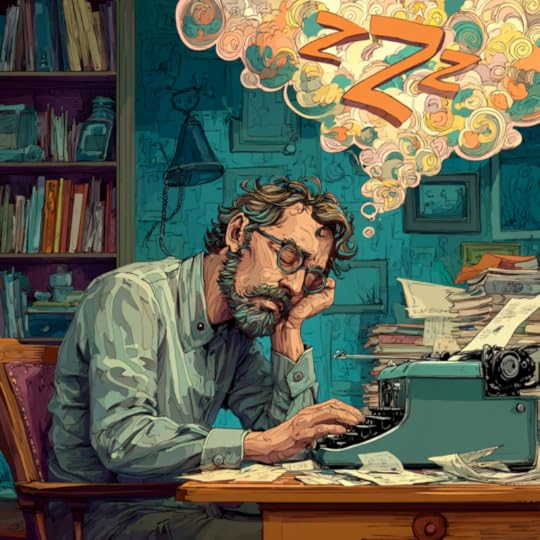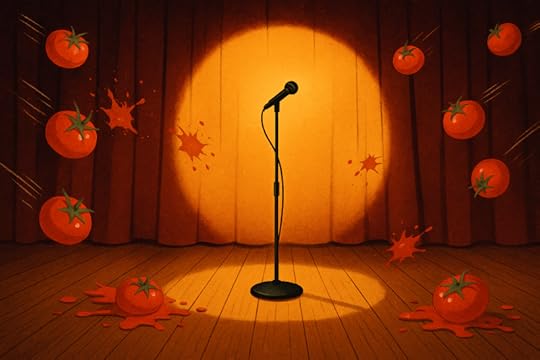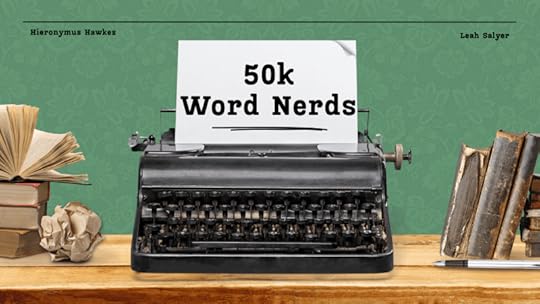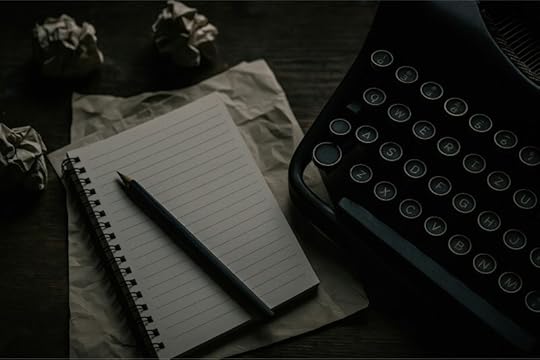Hieronymus Hawkes's Blog
November 20, 2025
Your Narrator Is Gaslighting You
And you’ll love every second of it. Why Writers Love Unreliable Narrators
 Photo by Waldemar Brandt on Unsplash
Photo by Waldemar Brandt on Unsplash#writingcommunity #booksky #amwriting #writing Unfettered Treacle on Substack
There is an ancient story from the Indian subcontinent. A group of blind men are brought to an elephant.
One feels the broad side and declares the elephant is a wall.Another touches the tusk—clearly a spear.The trunk? Obviously a snake.The leg? A tree.The ear? A fan.The tail? A rope.Each of them is partly right. None of them is completely right.
And they argue like bloodthirsty barristers, each convinced he alone has the truth.
That parable is often used to talk about philosophy or theology, but it’s also a perfect primer on the unreliable narrator.
Because most stories aren’t told by omniscient gods handing down objective facts. They’re told through eyes and minds, through characters who think they know what’s going on. Sometimes they’re wrong. Sometimes they lie. Sometimes they don’t even realize they’re lying to themselves.
That’s where the fun comes in.
Why use an unreliable narrator?
Hide a twist. The narrator’s version blinds us to what’s really happening (Fight Club, The Usual Suspects).Create dramatic irony. Readers notice the cracks before the character does, which adds tension.Deepen character. The mistakes, obsessions, and blind spots of the narrator show us who they are.Add layers. A second story runs beneath the first, the “real” version the reader pieces together.How to write one
The trick isn’t to withhold information, it’s to filter it through bias. Ask yourself:
What does this character notice first? A thief will clock the exits. A romantic will see the candlelight. A soldier might count weapons. All of them are describing the same room, but the room will look different depending on who’s talking.What assumptions do they bring? Do they believe everyone’s out to get them? That colors every interaction. Do they think they’re irresistible? Then every smile is a flirtation.What do they ignore? Silence in the description can be just as revealing as what they dwell on. A parent might skim right past the fact there are no kids around. A grieving character might “forget” to mention the wedding ring on someone else’s hand.Are they lying, or just mistaken? Decide whether your narrator is consciously shaping a story (lying to the reader) or simply trapped in their own flawed worldview. Both can be powerful—just be consistent.Practical tips
Use specific detail. The little things your narrator notices should feel true to them, even if the big picture is skewed.Drop cues. Give the reader hints that the version they’re getting isn’t the whole story.Balance the reveal. Don’t hold everything back, that just frustrates. Instead, let the reader feel clever for spotting what the narrator missed.Remember the elephant. Each perspective is partial. Stack them through different characters seeing the same things, and the reader sees more of the truth.Bias in action: Remi vs. Annie
Let’s make this concrete.
Take two characters from my current work in progress:
Remi: a vampire who has lived on Earth for hundreds of years and has sworn off drinking human blood directly from humans. To him, space stations are suffocating cages that reek of humanity. The recycled air carries a hundred thousand heartbeats, a thousand perfumes, a fog of temptation he refuses to touch. The place is a walking reminder of what he denies himself. To him, every docking arm looks like a cage and every corridor smells like confinement.Annie: grew up a Spacer. To her, space stations mean shore leave, bright lights, markets, music, sex, and maybe sneaking into a poker game. A station is a carnival. The air smells like possibility.Put them both on Jenay Station’s promenade, and you’ll get two utterly different truths:
Remi’s version (example not actually taken from the story):
Too many heartbeats, all crowding in, brushing against him with every step. The concourse reeked, sweat and perfume and fried food, all useless cover for the copper tang that clung to everything. He fixed his gaze forward. Don’t look. Don’t breathe too deep. Every inhale a dare, every exhale a reminder of promises he couldn’t afford to break. Part of him wanting nothing more than to pull one aside into an alley and drain them dry.
Annie’s version:
Neon, spice smoke, fried dough, same old backdrop. What stood out was the new sleepover on the frontage, its holo-sign pulsing bright like it owned the concourse. Shore-leave crowd would pack that place in no time. Stations still carried that buzz, a kind of holiday energy, the promise of fun tucked behind every closed door.
This is subjectivity, and it’s where unreliable narration shines. By filtering a scene through a character’s personal lens, what a character notices, what they emphasize, what they can’t stop smelling or seeing, all of it reveals as much about them as it does about the world.
Writing prompt: Pick an ordinary event, say, a market theft or a bar fight. Write it three times:
From the point of view of someone honest but mistaken.From someone who’s deliberately lying.From someone who doesn’t realize they’re lying to themselves.Then step back and look at what each version reveals, not just about the event, but about the character doing the telling. That’s the magic.
November 18, 2025
A Friendly Reminder to Touch Grass (Digitally Delivered)
Why we can’t outsource connection to a screen
 Photo by Tim Marshall on Unsplash
Photo by Tim Marshall on Unsplash#writingcommunity #booksky #amwriting #writing Unfettered Treacle on Substack
I read a fascinating piece Saturday by Ted Gioia about David Foster Wallace, how, long before smartphones or social media, he predicted the addictive pull of screens and the loneliness and depression that would follow. It’s remarkable how right he was.
I’ll be 61 next weekend, and the older I get the more obvious it becomes: you can’t live well staring at a screen all day. Zoom calls and text threads aren’t the same as looking someone in the eye, sharing a meal, or getting outside to do something. Anything. When you stop moving, stop engaging, you don’t last long. I’ve seen it happen to people I love.
That’s part of why I joined the Y this year. They’ve got everything from chair yoga to tai chi to swimming. I hadn’t been in a pool in over 30 years, and rebuilding stamina has been humbling, but I’m getting there. Three days a week now, aiming for daily. I want to fold in tai chi, yoga, maybe some free weights, but not spend my whole day at the gym. Balance, right?
When I was younger, balance wasn’t in the picture. I lost countless hours to online games, Neverwinter Nights on AOL, Ultima Online, EverQuest, World of Warcraft. Fun? Absolutely. But when I finally chose to take writing seriously, I walked away. No regrets. Games gave me entertainment, but nothing lasting to show for it at the end of the day. I wanted something concrete to show for my time spent.
Now I see echoes of that in my kids, all grown and in their twenties. They game a lot too, like that’s all they do when not at work or school, though lately it’s tabletop RPGs like D&D and Star Wars, played online with friends scattered across the world. It’s better than pure screen time, but it still means most of their social life happens through a monitor. That makes me a little sad. I regret giving them smartphones so early. Everyone else had one, and we didn’t want them left out, but I wish we’d stood firmer. The screen culture hit them right at their most formative years, and it changed the texture of their lives.
And it isn’t just games or phones. The whole system is built to monetize our attention. Radio, then TV, now apps and games, each one refining the art of keeping us hooked, selling ads, chasing dopamine hits. There’s no natural stopping point.
I have hope that our young people will find a way forward through all of this, but depression and social isolation are very real.At the core, we’re built for one another. Humans are social creatures. Our survival as a species didn’t come from isolating ourselves, it came from gathering around fires, working in groups, raising families, telling stories. Even the most independent among us still need the brush of another voice, another hand, another laugh in the air.
When we cut ourselves off, when all our interaction runs through devices, something in us withers. Loneliness isn’t just an emotion, it’s a warning light, the body’s way of saying you’re missing what keeps you alive. The older I get, the clearer that becomes. We need other people. Not likes. Not followers. Not another stream of text on a glowing rectangle. We need faces, voices, presence. Without that, we stop being fully human.
I’ve been carving out more device-free time, swimming again, playing golf with friends, saying yes when people ask me to get out of the house. Every time I do, I’m reminded that nothing on a screen compares to the company of real human beings.
So how about you? Have you found ways to step back from the screen and reconnect, with people, with movement, with the world around you?
And yes, I know the irony here, I’m asking you to interact with me online at the end of a post about how we need less of that. But maybe that’s the paradox of this moment, we have to talk about it here, so we remember to live it out there. Maybe the best outcome is that nobody sees this because they’re too busy living their lives offline.
November 17, 2025
If You’re Bored Writing It, We’re Bored Reading It
Tricks for keeping the in-between scenes alive

#writingcommunity #booksky #amwriting #writing Unfettered Treacle on Substack
I’ll confess something. I’m smack in the middle of one of those “boring” stretches in my own manuscript right now. The good stuff is already sketched in my head. I can see the big confrontation, the heist, the fireworks. But to get there, I’ve got this stretch of story that connects some of the pieces but feels like driving through Kansas.
And I keep thinking, why does it have to be this way? Why do we treat boring parts like a toll booth between the exciting ones?
Here’s what I’ve been reminding myself (and now, you):
1. Maybe it needs to go.
If writing it feels like slogging, that’s a clue. Cut it. Or at least trim it down to the bones. A surprising number of “necessary” pages turn out to be scaffolding the reader never needed to see.
2. Write the good stuff first.
When you’re stuck, jump ahead and write the scene you’re itching to get to. Once that’s on the page, you can look back and ask, “What has to happen to make this scene possible?” Suddenly, the in-between parts have purpose instead of padding. I personally struggle with this. I tend to write very linearly. But I’ll do it if I am stuck.
3. Find the pain.
One trick I stole from Orson Scott Card (filtered through other writers,) the most interesting viewpoint is usually the character who’s suffering the most. Ask, “Who’s hurting right now?” and write from their eyes. Pain is rarely boring.
4. Shake the snow globe.
If you’re sick of writing the same flavor of scene, change it up. Switch point of view. Change setting. If your thieves always meet in the alley, have them meet in a crowded bathhouse. If your POV has been the action hero, try the guard on the wall watching the action hero come flying at him. Same story beat with a fresh lens.
5. Throw in a wrinkle.
Does conflict always have to mean sword fights or shootouts? Sometimes it’s a horse losing a shoe or a nosy aunt showing up at the worst possible time. Tiny obstacles can be just as tense as ninja ambushes.
6. Play another note.
If your story has been pounding on action, try suspense, romance, or humor. A novel that only plays crash cymbals is exhausting. Let the flute have a solo now and then. (Rock flute is an ongoing joke with my wife. She is not a fan. Jethro Tull anyone?)
7. Lean on side characters.
Drop in an interesting supporting character, even just for a chapter. They can add color, voice, or a complication that makes the “boring” scene pop. Just stop them from stealing the whole show.
8. Watch for the “finally” trap.
If you catch yourself typing “Finally, they arrived at the city gates,” there is your red flag. Cut back and see if the three paragraphs before that word really earned their keep. Odds are, they didn’t.
So here I am, staring at this swampy middle stretch, trying not to bore myself. That’s my new north star, if I’m bored writing it, readers will be bored reading it. And if I can twist the knife, shake the snow globe, or skip the slog entirely, I owe it to the book, and you, to do that.
Because no one opens a novel hoping to read the boring parts.
November 11, 2025
How do you know if you’re winning?
Rethinking success before someone else defines it for you
 Photo by Chad Stembridge on Unsplash
Photo by Chad Stembridge on Unsplash#writingcommunity #booksky #amwriting #writing Unfettered Treacle on Substack
How do you measure success? And by whose standard?
For me, one obvious milestone was earning a spot at the U.S. Air Force Academy. By the standards of my younger self, that was the dream. I graduated, went into active duty, and eventually spent thirty-two years flying, twenty of them in the reserves, culminating as commander of a flying operations group. By most accounts, that’s a successful career.
But here’s the catch: I didn’t make full colonel. I retired as a lieutenant colonel, even while sitting in a colonel’s billet. Meanwhile, one of my classmates just retired as a four-star general. Several others made lieutenant general. By comparison, I could frame my career as “falling short.”
That’s the trap we all face: measuring ourselves against someone else’s scoreboard.
The truth is, I don’t know what my classmates had to sacrifice to reach those ranks. I can guess, family time, most likely. I chose differently. I tried to maximize family while still accepting that deployments and long hours were part of the deal. I loved flying jets, and my wife tolerated the chaos. That was our tradeoff.
After retiring, I became a simulator instructor. Within a few years, I was running the site. Solid work, steady results. Not flashy, but it mattered to the people I taught and the pilots I helped shape.
Now I’m a full-time writer. My last published book was in 2021, not exactly a prolific streak. Since then, I’ve written three short stories and two novels, but they’re not on shelves yet. Does that mean I’m failing? Or does it mean I’m still in the middle of the story?
Years ago, an artist at a convention ask a question that stuck with me: What would success look like to you?
Is it a traditionally published book with your name on the spine in Barnes & Noble?
Is it complete control of the process and a shelf full of indie titles with your imprint on them?
Is it praise for your prose, respect from your peers?
Or is it simply making a good living from your words, enough to pay the bills and keep going?
There isn’t a wrong answer, but if you don’t define it, someone else will define it for you.
Here’s the larger point, success isn’t a universal yardstick.
We can’t all be Travis Kelce or Taylor Swift. They’re thoroughbreds, outliers way out on the far end of the talent curve for their chosen fields. If you measure yourself against the most successful person in your profession, you’ll almost always come up short. Worse, you’ll ignore the wins you’ve already built.
And even for the outliers, there’s a cost. You don’t get to the far end of the bell curve without giving something up, time, privacy, relationships, health. The question isn’t whether you could chase that level of success, but whether you’d want the trade that comes with it.
So how should you measure success?
Here’s my working definition:
Success is aligning what you achieve with what you value.If you value career above all, maybe the brass ring is worth the climb. If you value family, relationships, creativity, or freedom, then success might look very different, and that’s not a downgrade. It’s a choice.
By my measure, I raised four kids into remarkable adults with college degrees, and they’re all wonderful additions to the human race. I have a marriage I’m grateful for. I live in a comfortable home. I get to write every day. That doesn’t look like a general’s retirement ceremony, but it looks like success to me.
So, the next time you feel the urge to stack yourself up against someone else, stop and ask:
What do I actually value?What am I willing to trade to get more of it?When I look back, what will I want to have carried with me?There are no free lunches. But you do get to choose the menu.
November 6, 2025
Violence on the Page: Consequences, Clarity, and the Temptation to Go Full Tarantino
When Fictional Bite Meets the Narrative Dentist Bill

#writingcommunity #booksky #amwriting #writing Unfettered Treacle on Substack
Violence sells. Books, movies, video games, you name it. If there’s blood, somebody’s making money off it. But writing violence is tricky business, because the moment you put it on the page you’re playing with fire. Done badly, it’s boring or cartoonish. Done lazily, it glamorizes harm. Done well, it reshapes the story and the character in ways that stick with the reader.
So how do we avoid turning violence into empty spectacle?
Violence Shapes Culture
Howard Taylor once said, “Violence is one of the ultimate shaping forces of human culture, and to not write about it is dishonest.”
Wars, revolutions, fistfights in the town square, these things ripple through history and through our characters. If you erase violence completely, you risk writing a world that feels sanitized and fake. Milktoasty.
But that doesn’t mean every book needs a John Wick body count. It means when you do put violence on the page, treat it like it matters.
Violence Without Consequence Is Cheap
Remember the lobby shootout in The Matrix? Beautiful choreography. Long coats flying. Guns blazing. But those guards? Just guys at work. No fallout. Neo and Trinity walk away like they just finished a yoga class.
It’s cool as hell, but it’s also empty.
If your hero mows down faceless henchmen and then goes to lunch like nothing happened, readers notice the disconnect. Violence as performance, not story.
Don’t get me wrong. The Matrix is one of my all-time favorites. And I love me some John Wick, but block buster movies like these and the entire Marvel Cinematic Universe is a genre all its own.
We can admit it, Tarantino shootouts, Marvel’s skyscraper-smashing battles, John Wick gunning down forty guys in a nightclub, it’s a rush. The choreography, the style, the sheer over-the-top bravado is entertaining. But that works best on screen, where music, timing, and visuals can turn mayhem into art. As a novelist you don’t have those shortcuts. To keep readers engaged, written violence needs to do more than entertain. Something has to change, someone is betrayed, a relationship fractures, a belief system buckles. If not all you have is blood and bullets with no story.
Even when the hero “wins,” they carry scars, physical, moral, psychological.
Readers feel cheated if the character walks away unchanged. Violence should leave a mark.
Tone Changes Everything
Violence isn’t always explosions and mayhem. Think Jackie Chan fighting twelve guys with a ladder. Nobody dies, but it’s still fighting, played for laughs. Compare that to Saving Private Ryan, where there was a gut punch at every turn. Same toolbox, different results.
Tone tells the reader what to feel. Horror, humor, tragedy, it’s not just what happens, but how you frame it.
Where’s the Line?
Every writer has to decide how far is too far. The real question is Am I glorifying this in a way that makes readers want to cheer for harm? Or am I making them feel the weight of it?
There’s no one answer. Some writers lean into consequence. Others lean into bravado. Most of us wobble somewhere between.
Almost everyone fears pain and death. That’s why violence works so well for raising stakes. It’s primal. It’s as old as man itself. But every act of violence in your story should carry a bill. Somebody has to pay it. The character, their relationships, maybe even the reader.
The hit isn’t the story. The fallout is.
A Little Homework (Don’t Worry, No Blood)
Try this:
Write the most over-the-top violent scene you can imagine. Go full Tarantino. Then write the morning after. Who buries the bodies? Who cleans up the mess? Who can’t sleep at night?
That’s where the story really lives.
November 4, 2025
I Found Your New Favorite Band
Lake Street Dive, Lawrence, and a theater with more magic than Miller High Life ever bottled

#writingcommunity #booksky #amwriting #writing Unfettered Treacle on Substack
Earlier this year we found out Lake Street Dive was playing sort of nearby. And by “nearby,” I mean a four-hour drive. That’s what counts as local in the Midwest. We’d seen them two years ago and they were phenomenal, so it didn’t take a lot of convincing.
Then we looked up who was opening. A band called Lawrence. Never heard of them. That’s always a little dicey. Sometimes you get a new favorite, sometimes you get thirty minutes of politely clapping while you wonder if the beer line is shorter now.
We checked them out on YouTube and, holy shit, blown away. That sealed the deal. Tickets purchased, road trip planned.
Turns out Lawrence is fronted by siblings Clyde and Gracie Lawrence. Now, Gracie? She just wrapped a run on Broadway. Not some tiny off-off-off-Broadway thing either. She was playing Connie Francis in Just in Time and got nominated for a Tony for Best Featured Actress in a Musical. A Tony. For real. Her voice? A jazzy soprano that just soars. Off the chart. Like, if Aretha and Ella had a Gen Z niece.
Clyde’s story is even crazier. He joined the Songwriters Guild of America when he was five. Five! I was still eating paste when I was five. He wrote a song for Miss Congeniality that made it into the movie, because his dad Marc was the writer and music director. Since then, Clyde’s written music for four other movies and a TV show, while also leading this band, while also somehow not making the rest of us feel completely unaccomplished. He’s got this deep, soulful voice I could listen to all day, and he hops between organ, piano, and guitar like it’s nothing.
The two of them have basically been jamming since childhood, but they made it official in 2013 when Gracie finished high school. Oh, and because apparently their family motto is “go big or go home,” they built it into an eight-piece funk-pop-soul machine. Seven of the eight members went to Brown University, so on top of ridiculous talent, they’re brainiacs too.
Their music? Pure high-energy fun. Funk, soul, pop, a little jazz swagger, horns blasting, rhythm section tighter than my jeans after Thanksgiving. Every single member is absurdly good at what they do. Live, they hit the stage like a freight train full of joy. By the end of their set I was already thinking: these guys might be one of my all-time favorite live bands. And I don’t say that lightly. I want to see them as often as humanly possible. Doesn’t even matter what song. They could play the phone book and it would groove. The musicianship is that good.
Here’s a taste if you’re curious:
https://www.youtube-nocookie.com/embed/YwozDusaQxs?rel=0&autoplay=0&showinfo=0&enablejsapi=0
If you haven’t heard them before, you are in for a treat. They’ve put out four studio albums (the latest dropped in 2024), and right now they’re headlining a tour to promote it.
The wild thing is, this wasn’t even their first tour with Lake Street Dive. Their very first tour ever was with them, so this show was like a reunion gig. They’ve written songs together, and a few of those collabs made it into the set. Watching both bands on stage together felt like crashing a family party where everyone just happens to be insanely talented.
And speaking of Lake Street Dive, let’s not shortchange them. Rachael Price? Her voice is straight velvet. Buttery smooth, effortless, the kind of vocals that make you stop mid-sip and just listen. The whole band is tight, with that perfect blend of pop, soul, funk, and jazz they’ve honed over the years. They’ve got this chemistry that makes everything look easy. Here is my favorite song by them:
https://www.youtube-nocookie.com/embed/BGQWnWgr8Nk?rel=0&autoplay=0&showinfo=0&enablejsapi=0
Between the two bands, the night was pure magic. The kind of concert you don’t just remember, you replay in your head for weeks.
The venue helped, too. Miller High Life Theater. Great name, great vibe. It somehow manages to feel cozy and intimate while still being spacious enough for a big crowd. The acoustics were killer. We’d definitely go back there for another show.
So yeah, we drove four hours, but it was worth every mile. We went for Lake Street Dive, discovered Lawrence in the process, and left grinning like kids who just got away with something. Nights like that are why I’ll never stop going to live shows.
October 30, 2025
The Art of Exposition
Or, How to Make Worldbuilding Feel Like Dessert, Not Vegetables

#writingcommunity #booksky #amwriting #writing Unfettered Treacle on Substack
Too much exposition is like being cornered at a party by a guy who says, “Let me tell you about my D&D campaign.” Ten minutes later, you’re still nodding politely while he’s explaining the mechanics of elven tax law. You’re not listening. You’re planning your escape route.
That’s the danger of exposition in fiction. We’ve all done it. We’ve built this whole intricate world in our heads, and when we sit down to write, the instinct is to dump it all out on the page, because the reader needs to know. Except … they really don’t. Not all at once.
What Not to Do
The Essay: “Here’s the history of my kingdom going back 1,000 years.” Nobody signed up for your PhD thesis.The Police Sketch: 50 physical details of a character we’ve just met. Half a page later, I remember they have hair? Maybe?The Thesis Statement: You know, the ol’ “Tell them what you are going to tell them, then tell them, then tell them what you told them.” That works good for an actual thesis, but not so much for fiction. “This is the story of how Gregor found himself.” Thanks, but I’d rather just read the story.Readers didn’t buy a ticket for the lecture series. They came for the characters.
What Actually Works
Three Good Details. Pick the ones that matter, scar, accent, nervous tic, and let the rest blur in. Readers are better at filling gaps than we give them credit for.Arguments. Two characters hashing it out on the page is instant exposition with flavor. You learn about the world and the people.The Tease. Hint at the cool thing, but hold back the explanation until it matters. Make exposition a payoff, not an entry fee.Every Sentence Should Multi-Task
Kurt Vonnegut said every sentence should do more than one thing. That applies double to exposition. If you’re explaining something, let it also reveal character, set the mood, or make the reader laugh.
Example:
“He adjusted the plasma rifle the way my uncle adjusted his dentures, loudly, and with no shame.”
That’s world-building (there are plasma rifles), character voice (snarky narrator), and humor all in one line.
The Old Switcheroo
Here’s a trick: take something hugely important in your world, like the way magic works, or how the galactic senate governs trade routes, and don’t explain it. Just let it sit there. The mystery makes the reader lean in.
Then take something totally trivial, like the recipe for space oatmeal, and explain the heck out of it. Suddenly, the world feels lived in.
Different Genres, Different Leashes
Exposition expectations shift.
Fantasy: readers expect a learning curve, but they still don’t want the Silmarillion dropped in their lap on page one.Science fiction: same deal—give me a ship’s engine and I’ll believe it runs on “quantum foam” without the physics lecture.Mystery/thriller: readers want to be one step behind, not three chapters ahead because you explained the whole plot in advance.Romance: honestly, the only exposition I care about is how good they look when they walk in the door and what’s standing in the way of the kiss.Point being, how much explaining you get away with depends on the contract with your readers.
The “As You Know, Bob” Problem
This is the most common rookie move.
“As you know, Bob, ever since the Glorious Revolution of ’72, all spaceships have been required to carry a trained ferret.”
If both characters already know it, they wouldn’t say it. The reader knows you’re just shoving in background. It’s like watching two actors wink at the camera.
Instead, give the info to someone who doesn’t know it. Or better yet, let the reader pick it up on their own.
Exposition by Friction
One of the best ways to sneak exposition in, put two characters in conflict. The disagreement itself becomes the delivery vehicle.
“You can’t take the northern road, everyone knows it’s haunted.”“Haunted? Or just full of your bandit friends collecting tolls?”Boom. In two lines we get setting, danger, character motives, and a little spice.
Exposition as Voice
Sometimes it’s not what you tell the reader, but how. A passionate, wrong-headed, or snarky narrator can make exposition fun. If your POV character has opinions, their version of the world will be interesting even when they’re explaining how door locks work.
The Iceberg Rule
Readers don’t need 100% of your world. If they see 10% above the surface, they’ll trust you that the other 90% exists under the water. Show restraint. It builds trust and intrigue.
Readers Don’t Mind Learning—They Mind Being Lectured
Think about the books you love. Did you stick around because the author carefully explained every last detail? Or because you were invested in the people, and you trusted the author to hand you the right puzzle pieces at the right time?
Good exposition is a trust exercise. You’re telling the reader, I’ll give you enough to follow along, and I’ll reward you with more when it matters.
And if you do it right, nobody’s planning an escape route from your book like they are at that party with the D&D guy.
October 28, 2025
Famous People, Dancing Monkeys, and the Cancel Button
Bros, Swifties, and the Culture Clash

#writingcommunity #booksky #amwriting #writing Unfettered Treacle on Substack
Celebrities are our modern gladiators. They perform, we cheer, we gossip, and then—when they misstep—we sharpen the knives. Social media makes it worse. It’s like everyone has a front-row seat and a rotten tomato in hand, just waiting for the signal to throw.
Take the Travis Kelce/Taylor Swift marriage frenzy. Half the internet is planning the wedding menu, the other half is already workshopping breakup-album titles. Then there’s the loud middle, locked in debate: is Travis smart enough for her? Will she let down an entire wing of feminism if she dares to marry a man? Should she stay single forever as a sort of secular saint of independence? Really?
My personal opinion, not that it matters in the least, is that Taylor is one of the savviest people in the music industry. She’s a smart cookie. Is she smarter than Travis? Maybe? Don’t know, don’t care. But I don’t think she would “settle” for someone that is dumb. Why would she? He makes her laugh, and he has his own money. He is maybe the greatest Tight end in history. She is obviously at the top of the pop world, an icon. Seems like they might have a chance if people let them. I am rooting for them to be happy.
It’s a little funny, but also a little unhinged. Two people fall in love, and suddenly the world acts like it’s a constitutional crisis. We treat them as if their personal lives belong to us, like Taylor’s vows will either usher in a golden age of empowerment or destroy the sisterhood as we know it.
And it’s not just celebrities. Remember the woman who tweeted a bad joke before her flight to South Africa? By the time she landed, she’d been fired, publicly shamed, and turned into a global cautionary tale. Twelve hours in the air, and her whole life unraveled at 30,000 feet.
That’s the world we live in now. One mistake, one dumb post, and you can go from anonymous to infamous before the drink cart comes by.
Celebrities are just the most visible targets—but the machinery of outrage is always hungry, and it doesn’t care if you’ve sold out stadiums or just have twenty followers.
We hold public figures to impossible standards. Perfect behavior, perfect opinions, perfect Instagram lighting. And the moment they step off script—marry the “wrong” guy, wear an outfit that doesn’t pass the vibe check—we pounce. Cancelled. Done. Next contestant, please.
The truth is, famous people are just flawed humans with better hair and worse privacy. They’re going to screw up, sometimes spectacularly. The difference is, you and I get to do our dumb stuff in private. No trending hashtags. No strangers debating the morality of who we married.
Maybe the healthier approach is to stop treating celebrities like moral barometers or live-in soap operas. Enjoy the music, the game, the performance. Let them be human. Because honestly? If my worst moments were broadcast to millions, I’d have been cancelled before high school graduation.
October 27, 2025
50k Word Nerds
A writing community for November and beyond

#writingcommunity #booksky #amwriting #writing Unfettered Treacle on Substack
Hey all you writers out there!
It’s that time of year again. I wrote about NaNoWriMo and Novel November here. But my good friend Leah Salyer and I wanted to bring back the community energy that Novel November doesn’t quite have, so we (mostly Leah, hats off) built our own space: 50K Word Nerds.
We’d love to write alongside you this month! Join us for writing sprints, encouragement, a few evergreen writing modules, perfect if you’re new to writing or just want a quick refresher before diving in.
We’ll be adding new modules each week. Everything’s hosted on Canvas, and it’s completely free.
Join us here: 50k Word Nerds. Alternatively, you can sign up at https://canvas.instructure.com/register and use the following join code: MENWRH
We are not the word police, so no pressure, no guilt, just good company and support for your writing adventure.
October 25, 2025
NaNoWriMo to Novel November: A New Chapter for the Write-In
The joy of reckless writing lives on
 Photo by Ajay Deewan on Unsplash
Photo by Ajay Deewan on Unsplash#writingcommunity #booksky #amwriting #writing Unfettered Treacle on Substack
I first attempted National Novel Writing Month (NaNoWriMo, for the uninitiated) back in 2010. My project was called Revelation Void, which sounds far more finished than it ever was. I managed to hammer out 50,000 words that November, technically a win, but I didn’t finish the novel. I crossed the line exhausted, clutching a half-formed story and far too many coffee receipts.
Every year after that, I tried again. Some years I made it halfway. Other years I tanked by week three. But I never lost the thrill of “Go! Write!” the community energy, the absurd optimism, the daily word-count adrenaline. The idea of trying to draft a novel in a month was a beacon, even when I sputtered out somewhere around chapter five.
And now, NaNoWriMo, as we knew it, is gone.
What NaNoWriMo Was
For anyone who missed its glory days, NaNoWriMo (pronounced NAN-oh-RY-moh) was a U.S.-based nonprofit that inspired writers around the world to attempt the impossible: 50,000 words in 30 days, every November.
It started in 1999 with just 21 brave souls and ballooned to more than 400,000 participants by 2022. Writers could set up profiles, post synopses, and connect through a global online community. Famous authors wrote “pep talks.” Local volunteers organized coffee-shop write-ins and midnight sprints.
The focus wasn’t on perfection; it was on momentum. NaNo taught you to shut up your inner editor and just get words down, messy, sprawling, glorious first drafts. For many of us, it made writing feel communal instead of lonely.
The Fall of NaNoWriMo
In April 2025, after more than two decades of late-night typing and caffeine-fueled camaraderie, NaNoWriMo announced it was shutting down.
It wasn’t sudden, the warning signs had been flashing for a while:
AI controversy: The organization’s stance on generative AI set off a storm. Their claim that condemning AI had “classist and ableist undertones” landed poorly, to say the least.Ethics scandals: Allegations in their Young Writers’ Program and mishandled complaints eroded trust.Volunteer burnout: Forum issues, leadership missteps, and disillusioned Municipal Liaisons slowly drained the life out of the movement.By the time the official announcement came, it felt like a creative obituary. NaNo had built something remarkable, and flawed, and when it fell, it left a crater in the writing community.
Enter Novel November — A Fresh Start
But good stories always find a sequel.
Into the void steps Novel November, a 30-day writing challenge from ProWritingAid that’s free, friendly, and very intentionally not NaNoWriMo 2.0 — though it’s clearly carrying the torch.
Here’s how it works:
It’s free to join (just make a ProWritingAid account).You get October prep time, plotting tools, workshops, and sprints.During November, you’ll find guided writing sessions, community chats, and live events with bestselling authors.You can log your word count manually or through integrations with Word, Scrivener, and Google Docs.For every writer who completes the challenge, ProWritingAid donates $2 to Room to Read , a literacy nonprofit helping kids worldwide.It’s like they took NaNo’s best DNA, the creative chaos, the communal drive, and rebuilt it with better lighting, and fewer existential crises (hopefully.)
Why This Matters (and Why I’m All In)
I’ve danced with failure under NaNo’s banner for years. I may have missed a year or two since 2010, but I’ve always loved the idea of starting something new every November, even if I don’t get very far. There’s something pure about that collective act of creative defiance.
Novel November feels like a lifeline.
We don’t need perfection; we need motivation to try again, to fail spectacularly, and to keep going anyway.
It offers:
A fresh, cleaner slate (no baggage, no drama).A structured rhythm: prep, sprint, finish.Community and accountability without a paywall.A charitable twist that turns word counts into good deeds.Whether you’re tackling a novel, a series of short stories, or even a pile of blog posts, it all counts.
Let’s do it together.
How You Can Join Me
Here’s the quickstart guide:
Visit the Novel November page.Register (or log in) and confirm your account.Start your October prep, plot, brainstorm, warm up with their 10k sprint.On November 1, join me in writing 1,667 words per day (or whatever pace you can swing).Use the community, attend sprints, and celebrate the small wins.I’ll be doing it right alongside you, late nights, caffeine, and all. They don’t have friend groups yet (it’s their first year, we’ll cut them some slack), but who knows? Maybe we’ll start our own.
If you’re joining in, drop a comment and tell me what you’re working on. Let’s see if we can fill November with a few more messy first drafts.



